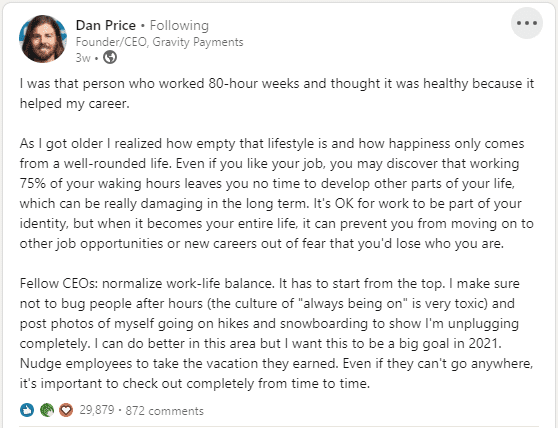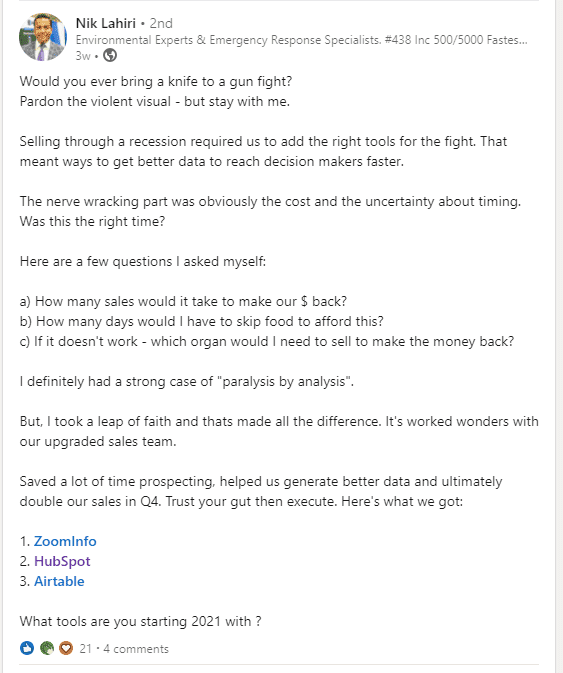15 B2B Marketing Trends for 2021: Rebranding, Restructuring, Refocusing
In the past year, businesses have had to adapt to previously unimaginable circumstances. Your company might have made tremendous shifts just to stay afloat. For many companies, part of that involved major changes to their marketing plans and budgets. But now, we can see a lifeline on the horizon.
As 2021 brings new hope for our health, our families, and the economy, it’s time to stop treading water. Dive into our B2B marketing predictions for 2021 to prepare for a year influenced by the unexpected. Learn how other companies have dealt with these challenges and use it to drive a brand message that resonates with a new era and a lead generation engine that carries you through whatever the current may bring.
1) The way we communicate matters more
In the past year, people have been largely confined to their homes, dealing with any number of fears, concerns, and stressors. They’ve faced illnesses, homeschooling their kids, remote work, layoffs, and so much more.
Because of this, your audience has become less tolerant of noise. The “same-old” marketing messages go in one ear and out the other.
And while there’s a light at the end of the tunnel, the way people want to engage with your brand will undoubtedly continue to shift. Sales and marketing messages that are not relevant to each persona you target—the role they serve in a company, their individual goals, and whether or not they’re ready to buy—may actually start to sting a brand.
Today, your audience expects a one-on-one personal touch. Companies will need to shift their communication methods and messages to reach a burnt-out audience. And that fact has guided many of our predictions for B2B marketing in 2021.
2) Companies will not be able to compete without marketing automation
In the past, marketing automation platforms like Hubspot were a nice-to-have, something that gave you a competitive advantage. But moving into 2021, it’s a necessity. This is becoming nearly non-negotiable. If you’re going to have a marketing function, you need marketing automation.
Your customer base is tired of sorting through noise. One-off email blasts or social posts will be ignored. In 2021, it’s about being able to segment and personalize based on your audience’s interests, where they are in the marketing funnel, and what they need most.
Related: How to Focus Your Marketing Approach
Marketing automation allows you to do just that. With the right technology, you can greet people by name and get granular about who they are. You can feed your audience the right information at the right time based on what they’ve done in the past, their industry, sector, size, and more.
To do that manually would be a ton of labor and time. In 2021, competitive marketers will take full advantage of marketing automation features such as workflows and lead scoring. Don’t bother marketing without it.
3) Forward-thinking companies will grow their marketing budgets
In 2020, the companies that suffered the fewest setbacks were those which, from a maturity standpoint, already had marketing established. Leads continued to trickle in thanks to a well-oiled marketing machine with a proven brand, targeted messaging, and engaging content.
In fact, some of Marketri’s strategic marketing consulting clients found opportunities to increase their marketing budgets. Because many companies stepped back from launching new long-term campaigns, they were able to refocus their budgets on projects like a rebrand. And those companies were able to enter 2021 with proven messaging and lead generation.
Forward-thinking companies will learn from this example and invest more—not less—into their marketing budgets. The uncertainty is nearly behind us, and you will need to press the pedal to keep leads in your marketing funnel.
4) Hybrid marketing functions will become the norm for large companies
We mentioned that forward-thinking companies will spend more money on marketing. However, we don’t expect much of it to go into maintaining bulky marketing teams.
Larger marketing functions that downsized during COVID-19 may not be re-hiring in-house marketing specialists any time soon. In 2020, we learned that anything can change, including revenue, goals, and staff. Companies have experienced firsthand the value of keeping marketing teams lean and agile.
We now know how important it is to be able to pivot and quickly react in changing times. That’s much harder to do when you have a marketing staff on payroll with relatively fixed skill sets.
We predict that larger companies will embrace more of a hybrid model for marketing moving forward. They may have a core in-house team, but they will outsource a lot of the marketing function to avoid uncomfortable layoffs and remain ready to adjust as needed.
Related: 3 Key Indicators That It’s Time to Outsource Marketing
5) Companies without marketing functions will move cautiously
For companies that have never marketed before, 2020 was not an ideal time to start. If marketing was previously in the budget for 2020, it was an easy thing to toss out. These companies may have struggled to stay afloat, and now they’re beginning to see how impossible it is to compete without marketing.
Still, emerging companies will move cautiously in the year ahead. Companies of all sizes have now experienced the fear—or reality—of having to lay off employees. By outsourcing their marketing functions, up-and-coming companies will be able to scale up or scale down as needed. They will be flexible, agile, and reduce their risk overall.
6) More companies will have to go back to the basics
In 2020, any marketing communications that could be perceived as aggressive were not welcome in a world of uncertainty and fear. Smart marketers pulled back quite a bit to avoid overwhelming their audience. And the savviest teams used this time to rethink some of the most vital ingredients of their marketing.
Last year, several companies decided to take stock and go back to the basics. They assessed their goals and revisited the building blocks of their marketing functions—strategy.
If your company has not yet taken a step back to reassess goals and strategies, 2021 will be the time to do so. It can no longer be about optimizing your AdWords account from time to time. Disjointed marketing efforts will not be effective. End-to-end consistency will be key—and that all starts with a plan. Get your infrastructure in order before executing new messages and marketing campaigns.
7) Marketing planning will look short-term
As we were creating marketing plans for our clients in 2020, we noticed a trend. Within a few months, our short-term plans would change. Content that seemed like a good idea to plan in May no longer made sense when it came time to execute in October or November. Planned social posts and emails no longer resonated after global turmoil or a major political event.
We had to change course so frequently that we decided it no longer made sense to create a go-to-market plan a year in advance—or even 6 months ahead. We started planning quarterly so our clients could easily pivot as needed to meet the ever-changing needs of potential customers.
So get your marketing infrastructure in order. Create a long-term strategy that helps you plan to maintain leads, no matter what happens. But when it comes to your go-to-market plan and program execution, think short-term, and be ready to adapt to changing circumstances.
8) Marketers will use care when formulating messaging and content
As we move into a post-COVID world, people won’t soon forget the various ways it impacted their lives. Whether they lost a loved one, lost a job, or simply felt the impact of a changing world, everyone has a story about how the pandemic changed their lives.
2020 was not the time to over-communicate. Marketers tried to be sensitive to people’s needs and scale down their marketing communications so as to not bombard a grieving audience. In addition, marketers realized they needed to use sensitivity in their messaging.
In 2021, that won’t change. Marketers will have to frame their message in accordance with the times. A rule of thumb: have your messaging reflect the culture you’d want to inspire in your own workplace. Do your homework, and ensure you treat your audience with the care and kindness you’d want to see in your own workplace.
9) Content experiences will be the new content marketing
Viola Eva wrote in Search Engine Journal that “Content Experiences Are the New Content Marketing,” and it resonated with us. When all of your content looks the same, users start to zone out. Of course, blogs can bring traffic to your site. But do yours bring true value to your readers? Or do they contribute to the noise your audience has grown less tolerant of?
In 2021, you have to be innovative to capture attention. More importantly, you have to keep people’s goals—and attention spans—in mind. Think beyond search engine optimization (SEO) and consider what your audience really needs to reach their goals.
More importantly, you should package this content in a way that makes it easy for people to find what they need to achieve their goals. That includes easy-to-use categorization and search capabilities within your resource center.
10) Visual communication will shun perfection
Written communication is not going away anytime soon. But video captures your audience’s attention and helps to drive a deeper emotional connection between your audience and your brand.
Filming a video to promote your business is a big to-do. Hiring a team for filmography, graphics, and editing typically costs at least $10,000. And COVID-19 has added new barriers to the process of in-person filming.
Thankfully, in 2021, people won’t necessarily care if your videos are well-produced.
In the past year, we’ve all grown accustomed to informal video communication. Through Zoom calls, webinars filmed from home, and even television commercials, we’re used to seeing people through their computer screens in their own home offices (or their bedrooms or kitchens).
If you want to reach your audience via video, it won’t have to be a big production with angled shots and B-roll footage. Not only are audiences more used to informal video connection, it’s sometimes a better option. So film an explainer video, a how-to, or a product demo from your kitchen. You’ll connect with your audience in a new way and demonstrate the humanity beneath your brand.
11) B2B marketing will focus on millennials
News flash: the oldest millennials are approaching their 40s. Millennials are executives at major companies and startups alike. So while B2C companies have been targeting millennials for many years, B2B companies are just now starting to realize how important this demographic is.
We have to become more aware of their communication preferences as buyers. Studies show millennials avoid phone calls and face-to-face interactions. They care when companies share their values and work towards a better future. How will you adjust your communication methods and messages to meet these preferences?
12) Accessibility will be a necessity
The ADA (Americans with Disabilities Act) requires public-facing websites to have no barriers to access for people with disabilities. In 2021, companies that don’t comply with these guidelines may face lawsuits. Websites may also be penalized by popular search engines like Google and Bing.
But above all else, making your website accessible is the right thing to do.
Of course, no one intends to create a website that people cannot access. Many may not know about web requirements like:
- Adding alt tags to images so the visually impaired can access them via screen readers
- Captioning videos for the hearing impaired
- Allowing all content to be accessible via keyboard only (not just a mouse)
- Eliminating frequent bright flashing on a page
- Organizing content in a logical order
This year, make it a goal to stay informed about website accessibility. Use web developers who prioritize accessible methods and tools and enable features that allow anyone full access of your website.
13) Google will prioritize website speed
In the past decade, Google has made updates to its search algorithm that help ensure users get the best possible experience from their top results. Algorithm changes have seen that only the most relevant websites to your search terms appear at the top.
And this year, Google is planning to kick it up a notch. Google’s page experience update, announced in 2020, will launch in May 2021. Here’s how Google explains it:
The page experience signal measures aspects of how users perceive the experience of interacting with a web page. Optimizing for these factors makes the web more delightful for users across all web browsers and surfaces, and helps sites evolve towards user expectations on mobile. We believe this will contribute to business success on the web as users grow more engaged and can transact with less friction.
That includes factors like mobile friendliness, ease-of-use, and—something too often neglected—site speed. A website that loads slowly frustrates users, and Google knows that. Optimizing your website to improve site speed can help ensure your rankings don’t fall significantly in May of 2021.
14) Social strategies will merge the personal with the professional
In 2020, many of our professional lives merged with our personal lives. Kids were in the background of our Zoom calls, dogs barked during major deals, and unstable internet connections made meetings a pain.
But in some ways, introducing an element of the personal was good for business. Shared struggles made businesses seem more relatable. And some content creators used social media to relate to their audiences on a more personal level.
On LinkedIn, CEOs like Dan Price of Gravity Payments shared his personal values and how those have shaped his business policies during the pandemic.

B2B stakeholders like Nik Essel of Essel Environmental shares tips, ideas, and questions with fellow business owners and frequently commented on others’ posts.

We predict that a personal touch and a strong viewpoint will go a long way on social media in 2021.
15) Authenticity will be valued over all else
Finally, no matter what marketing moves you make in 2021, they should be guided by authenticity. The most successful marketers will prove they have a passion for the work they do. They will openly display their core values and attract customers whose values align with their own.
Across your company, employees will have to live your brand—authentically. It’s not enough to say people can trust your company. From customer service to accounting to HR, everyone throughout your company should reflect the experience you claim to provide.
So how can you become more transparent and authentic in the year ahead while generating leads for your business? Reach out to Marketri to get started on a strategic marketing plan tailored to a new era and check out our Guide to Modern Marketing below.





